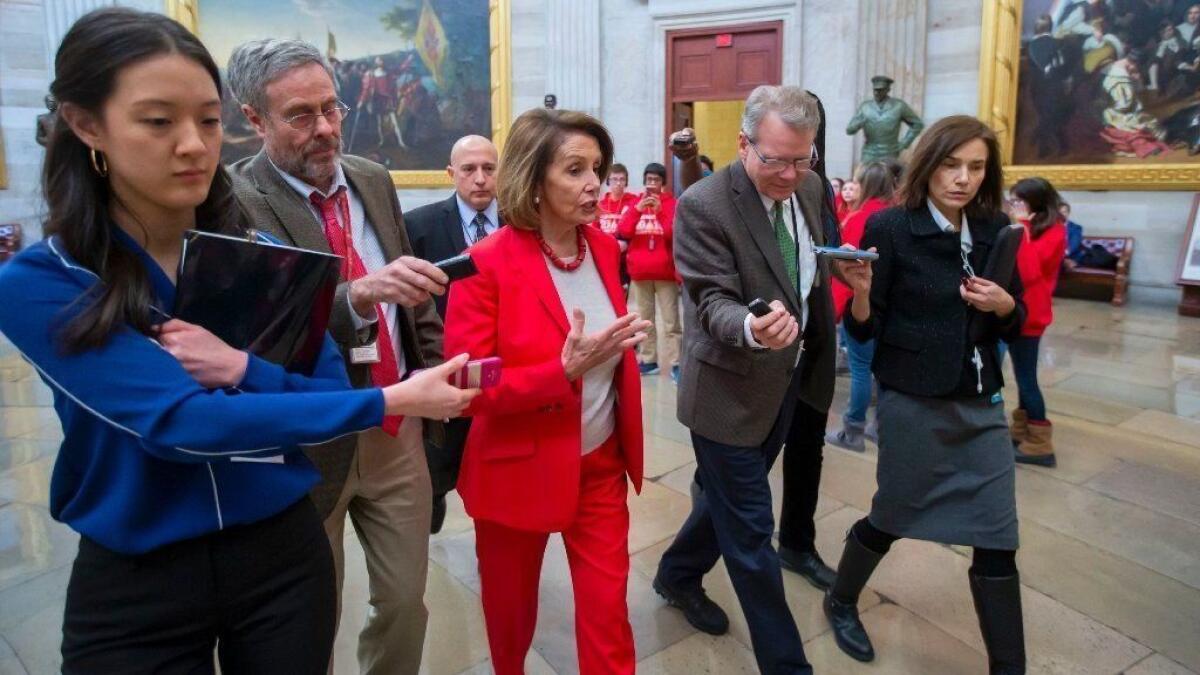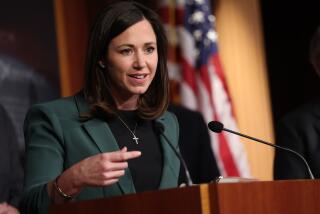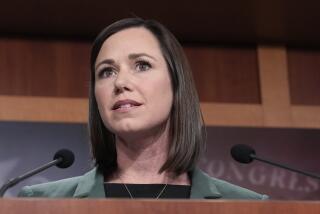Even the venerable State of the Union address can’t escape shutdown’s bitterness

House Speaker Nancy Pelosi on Wednesday effectively delayed President Trump’s State of the Union address, citing security concerns amid a nearly month-old partial government shutdown, while underscoring the political and policy paralysis behind it.
Pelosi’s decision appeared to catch the White House flat-footed — by late in the day it had not responded to her letter of that morning. The development brought into sharper relief the partisanship that’s not only at the root of the current impasse over government funding but is deepening as a result of it, just weeks into Trump’s power-sharing with a Democratic-controlled House.
With both Trump and Democrats responsive to their most vocal supporters, who oppose compromise, one of Washington’s most venerable traditions — the president’s annual address to a joint session of Congress, the Supreme Court and the diplomatic corps — became a casualty. Laws too: The administration has disregarded those governing shutdowns, and ordered tens of thousands of unpaid employees back to work based on largely political calculations.
“In these kinds of congressional-White House dealings, there are certain parameters that people are used to, and we’re sort of running outside the lines here,” said John Lawrence, a former chief of staff to Pelosi who experienced a number of federal shutdowns during four decades working in Congress.
Unlike past standoffs that revolved around budget issues, the current impasse over the president’s demand for $5.7 billion to build a southern border wall has left little room for compromise, given Democrats’ opposition and that of many Americans.
“It’s not like with numbers where you can split the difference,” Lawrence said. “You can’t build a 3-foot wall instead of a 12-foot wall.” Both sides, he said, are puzzled: “How do we get out of this?”
The postponement or cancellation of the president’s address suspends a ritual of American political life that began with Woodrow Wilson in 1913 and became an annual tradition starting with Franklin D. Roosevelt. Before that, from George Washington into the early 20th century, presidents sent written reports on the state of the nation, in keeping with a constitutional requirement.
For now, at least, Pelosi has denied the television-obsessed Trump an opportunity to reach many millions of Americans and presumably blame Democrats for the impasse, though he did so recently in a prime-time TV address to no effect. That she would take such action for an event nearly two weeks away suggests no quick end to a shutdown that’s closed a quarter of the government.
In her letter to Trump, Pelosi said the Secret Service and Department of Homeland Security, which are responsible for security at the president’s address, have been “hamstrung” by furloughs.
“Sadly, given the security concerns and unless government re-opens this week, I suggest that we work together to determine another suitable date after government has re-opened for this address or for you to consider delivering your State of the Union address in writing to the Congress on January 29th,” Pelosi wrote.
The administration’s initial response came in a tweet Wednesday afternoon from Department of Homeland Security Secretary Kirstjen Nielsen, who said her agency and the Secret Service are “fully prepared to support and secure the State of the Union.”
Although Pelosi’s letter appeared to be a request, the reality — that, as speaker, she has authority over what happens in the House — was quickly hammered home in more pointed terms by her Democratic lieutenants.
“The State of the Union is off,” House Majority Leader Steny H. Hoyer of Maryland said on CNN.
Rep. Hakeem Jeffries of New York was more confrontational, taunting Trump in a tweet that referred to federal prosecutors’ designation for the president — Individual 1 — in recent indictments of his associates.
“Individual 1 will not be permitted to deliver his state of the union address until government is reopened,” Jeffries wrote. “Welcome to life in the New Democratic Majority. Get used to it.”
However valid the security concerns Pelosi cited in her letter, Republicans criticized the action. “I’m worried about security too,” said Rep. Kevin McCarthy of Bakersfield, the House minority leader. “But I’m worried about security on the southern border.”
Alex Conant, a Republican strategist, said it could set “a bad precedent” for Congress to prevent a president of the opposite party from addressing the legislative branch.
Trump, who has seemed to back away from his controversial talk of declaring a national emergency to get wall funding without congressional approval, continued to hold meetings at the White House, intent on presenting at least the semblance of negotiations even as he’s rejected bipartisan overtures and refused to give ground.
He met Wednesday with seven moderate House Democrats, probing for fissures in their party. Yet the lawmakers made clear in a statement beforehand that a substantive negotiation about border security funding “can only begin in earnest once the government is reopened” — echoing a point Pelosi and Senate Democratic leader Charles E. Schumer have made in meetings with Trump and in interviews.
Still, the White House called the meeting “constructive.”
“They listened to one another and now both have a good understanding of what the other wants,” said Sarah Huckabee Sanders, the White House press secretary, in a statement. “We look forward to more conversations like this.”
The Democrats who attended largely agreed with that assessment. Generally, the party supported Pelosi’s move.
“Half the government is shut down and we’re pretending like it’s business as usual and inviting him in for a joint session speech?” said Rep. Ron Kind of Wisconsin, who hails from a district Trump carried in 2016.
Democrats’ support wasn’t universal. Rep. Ro Khanna of Fremont told SiriusXM, “There are certain norms in our democracy that are important to preserve.”
Clearly concerned about the shutdown’s impact on many of his supporters, including farmers, Trump has summoned tens of thousands of government employees back to work — without pay.
The Department of Agriculture announced that it is recalling 2,500 employees to open almost half of the Farm Service Administration offices across the country on Thursday, Friday and next Tuesday. They will assist farmers with loan requests, reflecting a rising concern as planting season approaches.
Earlier this week, the Federal Aviation Administration said it was bringing back thousands of furloughed inspectors and other employees to ease backlogs at many airports. In response to concerns about tax refunds being delayed, the Internal Revenue Service will have up to 80,000 employees back on the job, an eight-fold increase from the current force.
A new poll from the nonpartisan Pew Research Center underscored why compromise is difficult: Both sides have become more unified, and dug in, in the fight over a border wall. Democrats’ support for a wall is at a record low, while Republicans’ has hit a new high.
Among Democrats and independents who lean Democratic, more than 80% say that giving Trump the money he has requested would be “unacceptable” even if that were “the only way to end the government shutdown,” according to the survey, conducted in the last week.
Republicans are somewhat less united, yet just over 60% say it would be unacceptable not to give Trump the money he has asked for, the poll found.
The public disapproves of how both sides have handled negotiations, but disapproval of Trump is both more widespread and more intense.
The poll found that 61% of the public disapproves of how Trump has handled the situation, including more than half, 53%, who strongly disapprove, compared to 36% who approve. Asked about Democratic leaders’ performance, 53% of the public disapproves, including 33% who strongly disapprove, while 43% approves.
Sen. Tim Scott (R-S.C.) told reporters that constituent calls to his offices reflect the divide. “It suggests to me,” he said, “that people are dug in and they want their representatives to stay where they are.”
Times staff writers Jennifer Haberkorn and David Lauter contributed to this report.
More to Read
Get the L.A. Times Politics newsletter
Deeply reported insights into legislation, politics and policy from Sacramento, Washington and beyond. In your inbox three times per week.
You may occasionally receive promotional content from the Los Angeles Times.








